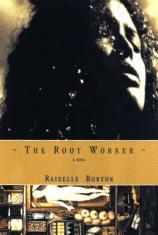The Root Worker
Review
The Root Worker
THE ROOT WORKER is a poignant tale of an 11-year-old African
American girl's disintegration and reintegration into the human
race. Set in Detroit in the 1960s, we see this tragedy played out
against the backdrop of Catholicism and Voodoo. The cruelty found
in both religions provides a sharp contrast and mirror to each
other. This is also a story of scapegoating, wherein one child is
held responsible for all the dysfunction in the family.
The main character, Ellen, finds a way to survive in an insane
household. She is so abused by her mother that she dissociates into
a second personality named Clarissa. Molested and impregnated by a
family member, she struggles to understand what is happening to
her. With all the pathos of a Greek Tragedy, we watch Ellen's
continued victimization and descent into insanity with pity and
horror.
Although the story is told from Ellen's first-person point of view,
she is an unreliable narrator due to her mental condition. At the
same time, ironically, of all the family members, she is probably
the most in touch with reality. Sometimes we're not sure if she is
Clarissa telling the story or Ellen, so we find two voices within
one novel --- an effective literary device for this book.
In naming her mother "The Woman" and her father "The Husband,"
Ellen proclaims her sense of alienation within her own family. "The
Woman" is a fearful person manipulated by the neighborhood "Root
Worker." In reading, we discover the source of some of "The
Woman's" villainy, which springs from her own sense of abandonment
by her mother and her own fear of "roots." "The Husband" is a man
also afraid of "roots." The marriage is a study of two persons
working and using "roots" on and against each other.
A carry over from the religion of voodoo, many of the fears of
"roots" came from the South. "Roots" were curses people believed
were worked on them through their food, through their hair, or even
through the dead. Ellen's mother believes that the child has worked
"roots" on her and commits every type of abuse to try to exorcise
this "evil."
Through all these experiences, Ellen is in search of "glue," a
harbor of safety. We watch as Ellen's life becomes like an ongoing
puzzle of horrors until one day "The Cila Lady" moves in. From
inference, "The Cila Lady," whose name is Barbara, is considered to
be a Voodoo Priestess. Ellen's mother and Aunt Della are convinced
that she is also a Root Worker, but Barbara brings a different
power than "The Root Worker" --- she wields the power of love. But
is it too late? By then, Ellen seems to have lost the ability to
trust or to love.
The writing style is particularly strong throughout the novel. In
the somewhat surprise ending, Burton writes, "...as long as the
foundation's good, it's salvageable." Although she is speaking of
refurbishing an old abandoned Catholic School, this is a metaphor
for people. When I finished the novel, I felt satisfied, as though
I had partaken of a meal of substance. I found THE ROOT WORKER to
have humor as well as tragedy and I often laughed out loud at our
human pretenses and foibles.
Overall, this is a tale of betrayal, friendship, and the redeeming
power of love. Sure to be compared to Pecola of Toni Morrison's THE
BLUEST EYE and Celie of Alice Walker's COLOR PURPLE, I look forward
to reading Ms. Burton's future works.
Reviewed by Maxine E. Thompson on January 23, 2011
The Root Worker
- Publication Date: May 21, 2001
- Genres: Fiction
- Hardcover: 208 pages
- Publisher: Overlook Hardcover
- ISBN-10: 1585671401
- ISBN-13: 9781585671403



